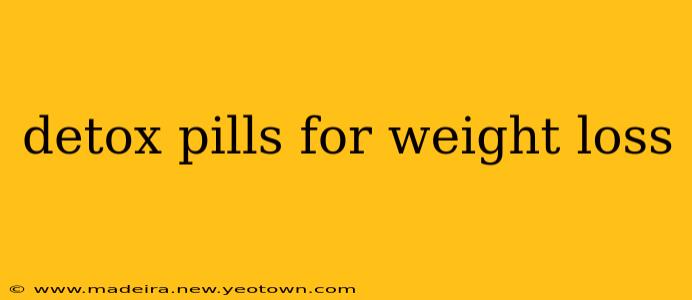The allure of quick weight loss is undeniable, and the market is flooded with products promising rapid results. Detox pills, often marketed as a simple solution to shedding those extra pounds, frequently capture the attention of those seeking a shortcut to a slimmer physique. But do these pills actually work? And more importantly, are they safe? Let's delve into the world of detox pills for weight loss, separating fact from fiction and exploring the potential risks and benefits.
My name is Alex, and I've spent years researching the health and wellness industry, specifically focusing on the claims made by weight loss supplements. I'm passionate about empowering individuals with accurate information to make informed decisions about their health journey. This article will provide you with the facts, so you can decide what's best for you.
Do Detox Pills Actually Help with Weight Loss?
The truth is, the weight loss associated with detox pills is often temporary and rarely sustainable. Most of the weight lost initially is due to fluid loss, not actual fat reduction. These pills often contain diuretics and laxatives, which promote bowel movements and urination, leading to a decrease in water weight. This quick drop on the scale can be misleading and is not indicative of real, lasting weight loss. Once you stop taking the pills, the weight often comes back.
Furthermore, many detox pills contain ingredients that haven't been rigorously tested for long-term safety and efficacy. The purported benefits are often based on anecdotal evidence or limited studies, not robust scientific research.
What are the Ingredients in Detox Pills?
Detox pills typically contain a mix of ingredients, which can vary widely from product to product. Some common ingredients include:
- Diuretics: These increase urine production, leading to water loss.
- Laxatives: These stimulate bowel movements, also contributing to fluid loss.
- Herbal extracts: Often touted for their supposed metabolism-boosting or appetite-suppressing properties, but the scientific evidence supporting these claims is frequently weak.
- Fiber: While fiber is beneficial for overall health, the amounts in detox pills are often insufficient to produce significant weight loss.
Are Detox Pills Safe?
The safety of detox pills is a significant concern. While some ingredients may be generally safe in moderation, the potential side effects can be quite serious, especially with long-term use. These side effects can include:
- Dehydration: Diuretics and laxatives can lead to severe dehydration, potentially causing electrolyte imbalances.
- Nutrient deficiencies: The frequent bowel movements can lead to a loss of essential nutrients.
- Kidney damage: Excessive diuretic use can strain the kidneys.
- Liver damage: Some herbal ingredients can be toxic to the liver.
- Interactions with medications: Detox pills can interact negatively with other medications you may be taking.
What are the Side Effects of Detox Pills?
As mentioned above, potential side effects can range from mild discomfort (such as nausea and stomach cramps) to serious health problems like kidney or liver damage. The severity of side effects depends on several factors, including the specific ingredients, the dosage, and individual sensitivities. It's crucial to consult a doctor before taking any detox pills.
What are Healthier Alternatives for Weight Loss?
Instead of relying on detox pills, focus on sustainable lifestyle changes that support long-term weight management. These include:
- Balanced diet: A diet rich in fruits, vegetables, whole grains, and lean protein.
- Regular exercise: Aim for at least 150 minutes of moderate-intensity aerobic activity per week.
- Sufficient sleep: Aim for 7-9 hours of quality sleep each night.
- Stress management: Chronic stress can affect weight management. Find healthy ways to cope with stress.
- Professional guidance: A registered dietitian or healthcare professional can provide personalized guidance on weight loss and healthy eating.
Conclusion
While the appeal of quick fixes is tempting, detox pills for weight loss are rarely a safe or effective solution. They often lead to temporary weight loss through fluid loss, rather than actual fat reduction, and can pose significant health risks. Prioritize a holistic approach to weight management, focusing on a balanced diet, regular exercise, and stress management for sustainable and healthy weight loss. Always consult with a healthcare professional before starting any weight loss program or taking any supplements. Remember, your health is your greatest asset, and making informed decisions is crucial for your well-being.

